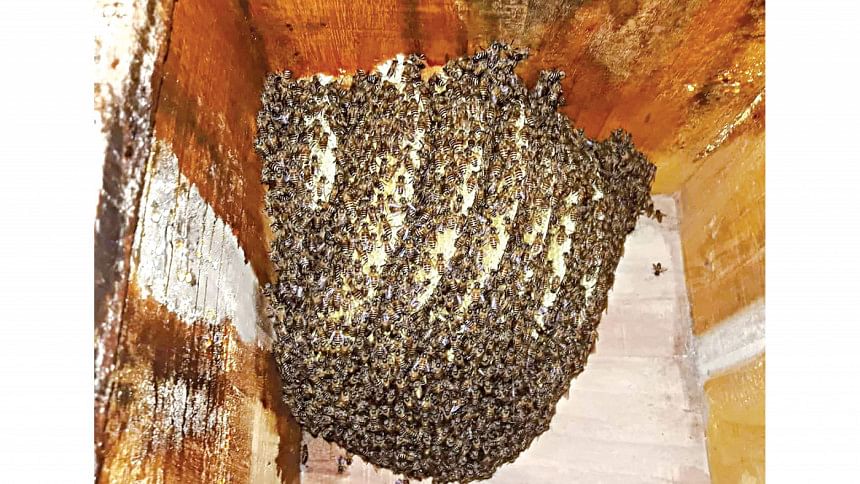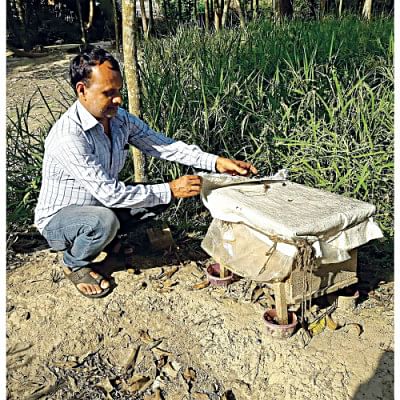Honey farming a new hope for small entrepreneurs

Honey cultivation has proved to be a profitable venture for many farmers, especially small-scale entrepreneurs, in Sylhet division and as a result, people are becoming increasingly interested in the practice.
The region produced about 15,215 kilogrammes (kgs) of honey in fiscal 2020-21, when the production target was 15,000 kgs.
During a visit to Adampur village in Kamalganj upazila of Moulvibazar district, this correspondent found that most houses featured wooden or tin brood boxes that filled the air with the gentle buzzing of bees.
These boxes act as beehives where honey is collected and once full, farmers collect the organic sweetener for sale. Besides, they can earn some extra money by breeding queen bees for other farmers.
Altaf Mahmud Talukder, president of Kamalganj Upazila Honey Farmer Entrepreneur Development Council, said each brood box provides an average income of Tk 10,000 per year without much effort.

Mahmud went on to say that there now are more than 400 beekeepers in different villages of the upazila's Adampur and Islampur unions.
How It All Began
In the past, people would go to the Rajkandi forest next to Adampur to collect honey from beehives naturally built in trees, according to locals. However, as more and more people rushed to the area in search of this pure honey, modern methods of bee farming, namely the brood boxes, were introduced, said Ahmed Siraj, adviser to Kamalganj Upazila Honey Farmers Entrepreneurs Development Council.
As this initiative proved to be profitable, honey farming has expanded commercially from house to house in the area for the past 10 years to 12 years.
Azad Mia, a farmer of Kanthalkandi village near Rajkandi forest, said he used to collect honey from the trees but after capturing a queen bee and placing it in his brood box, he was able to commercially produce the sweetener.
A Multi-Crore Taka Industry
With 400 beekeepers spread throughout the region, industry insiders say the honey farming business is worth crores.
Dr Monir Ali, a resident of the area, is a newcomer to the industry with 33 brood boxes, of which 22 are at home and 11 spread out elsewhere.
"I sold honey worth Tk 50,000 last year and there is no cost other than making the box," he said.
The Bangladesh Small and Cottage Industries Corporation (BSCIC) provides training and loans to beekeepers in the region but more support is needed, Ali added.
Farmers say that Adampur and its neighbouring Islampur have a naturally favourable environment for honey cultivation.
Honey farmer Furkan Mia said there were many local seasonal fruit and flower trees in the forest from which their bees collect honey.
The industry is also helping to alleviate unemployment in the region to a great extent, said Ahmed Siraj, president of Kamalganj Small Cottage Industrialists Development Council.
Experts' Comments
Md Makhdum Elahi Mashravi Shams, deputy general manager of the BSCIC office in Moulvibazar, told this correspondent that honeybees produce various commodities, such as honey, beeswax, pollen, and jelly.
By selling these items at local markets, beekeepers get good economic returns, which ultimately helps enrich the local economy, he said.
Abdul Momin, agriculture officer of Moulvibazar's Kulaura upazila, said the production of bee-friendly crops was very low in this area.
Prof Chandra Kanta Dash, chairman of the entomology department of Sylhet Agricultural University, told this correspondent that honey farmers need technological support, financial assistance and a sound marketing system.
It is possible to make honey farming a million-dollar business for the country, creating a huge number of jobs in the process. Many unemployed people can be involved in honey bee farming and the marketing process, which will ultimately help reduce poverty apart from giving a boost to the country's export earnings.
Therefore, research is needed on the problems and possibilities of honey cultivation in Sylhet.
"I submitted a project to the University Grants Commission to analyse it for research. Then the details can be known easily," he added.

 For all latest news, follow The Daily Star's Google News channel.
For all latest news, follow The Daily Star's Google News channel. 



Comments